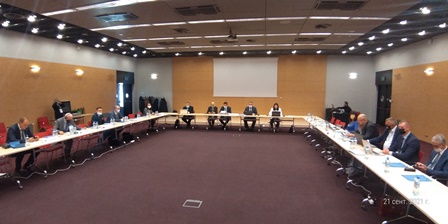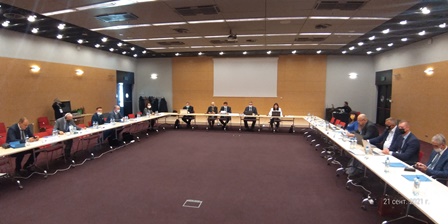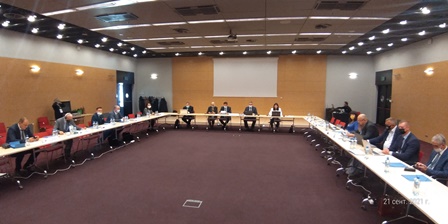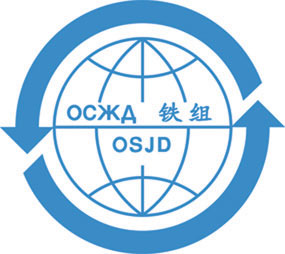9th International Interagency Meeting of OSJD Member Countries on the Practices of Border Crossing by Railway Transport



Under the Work Plan of the OSJD Commission on Transport Policy and Development Strategy for 2021, the 9th International Interagency Meeting of OSJD Member Countries on the Practices of Border Crossing by Railway Transport was organised and conducted by the OSJD Committee in a hybrid format on 21-22 September 2021. The event addressed the topical area “Development of measures aimed to facilitate border crossing in international railway transport operations in Eurasia”, and its face-to-face part took place in Gdańsk, Poland.
The meeting was attended by the representatives of transport ministries, customs and border services, and railway administrations of OSJD members countries: Republic of Azerbaijan, Republic of Belarus, Republic of Bulgaria, Georgia, Republic of Kazakhstan, Republic of Latvia, Republic of Lithuania, Republic of Moldova, Mongolia, Republic of Poland, Russian Federation, Slovak Republic, Republic of Tajikistan, and Republic of Estonia. Also represented were: the OSJD observers – the Federal Passenger Company JSC (FPC) and VR Group (Finnish Railways); the international organisations in the field of railway transport – the UN Economic Commission for Europe (UNECE), UN Economic and Social Commission for Asia and the Pacific (UNESCAP), Eurasian Economic Commission (EAEC), International Rail Transport Committee (CIT), International Coordinating Council on Trans-Eurasian Transportation (CCTT), and the OSJD Committee.
Opening the 9th International Interagency Meeting, the Chairperson of the Meeting, Ms. Diana Iurkovsky, Specialist of the OSJD Commission on Transport Policy and Development Strategy, underscored the importance and timeliness of the 9th International Interagency Meeting for further strengthening of sustainable transport connectivity of Europe and Asia in the context of the ongoing pandemic.
In the post-pandemic period, OSJD member countries should be able to build back more efficient logistics chains spanning the entire continent of Eurasia, since further restoration of Eurasian countries’ economies would greatly depend on that ability.
The meeting participants were greeted by Mr. Mikhail Vsevolozhskiy, Deputy Chairman of the OSJD Committee, who delivered a welcome address on behalf of the OSJD Committee’s Chairman Mr. Mirosław Antonowicz. The meeting participants were thanked for their support and cooperation in such a difficult situation that had affected all countries. Mr. Vsevolozhskiy highlighted the importance of all aspects of border crossing since border crossing had a major effect on the overall efficiency of railway transport operations and those in turn impacted the progress and success of trade relations between countries engaged in passenger and freight transport operations, and eventually the financial well-being of such countries. Mr. Vsevolozhskiy expressed his confidence that the experience and best practices in border crossing procedures would be turned into specific recommendations and find a wider application across the industry.
Mr. Andrzej Bittel, Deputy Minister of Infra structure of the Republic of Poland, greeted the participants on behalf of the Polish Ministry of Infrastructure. He emphasised the relevance of the Meeting and the important role of concerted action by government authorities and railway companies in the course of international railway transport operations, and the value of sharing the best practices in border crossing facilitation in the traffic between Europe and Asia.
During the three sessions of the Meeting, the participants made the following presentations, reports, and speeches.
Session 1. Experience of OSJD member countries in facilitating border crossing procedures
- OSJD efforts to facilitate border crossing by rail transport in international freight and passenger traffic, by Ms. Diana Iurkovsky, Specialist of the OSJD Commission on Transport Policy and Development Strategy;
- Experience of the Republic of Bulgaria in facilitating border crossing procedures, by Ms. Daniela Nikolova, Senior Expert, Directorate of Regulations, Railway Administration Executive Agency, the Ministry of Transport, Information Technologies, and Communications of the Republic of Bulgaria;
- Experience of OSJD member countries in facilitating border crossing procedures, by Mr. Igor Leshishin, Head of the Division of International Relations and Relations with Federal and Regional Government Agencies, and Relations with Public Associations, Federal Passenger Company JSC;
- Infrastructure development work performed by the Republic of Poland at border crossings on the border with the Republic of Belarus, Russian Federation, and Ukraine in order to facilitate the crossing of borders, by Mr. Szymon Grygiel, Head of the Division of Strategy and International Affairs, Railway Department, Ministry of Infrastructure of the Republic of Poland;
- Infrastructure and rolling stock in OSJD member countries, Ms. Angelina Shurganova, OSJD Committee member from the Republic of Azerbaijan, Specialist of the OSJD Commission on Infrastructure and Rolling Stock.
Session 2. Actions and programmes in the period of the COVID-19 pandemic: experiences of countries and international organisations
- Actions and programmes in the period of the COVID-19 pandemic: preventive measures, by Mr. Askhat Sarayev, Director of the Department of Occupational and Environmental Safety, “Kazakhstan Temir Zholy National Company” JSC;
- Practice in border crossing by railway transport, by Mr. Cesare Brand, CIT General Secretary.
Session 3. International law as a foundation of customs regulation of foreign trade in OSJD member countries
- Infrastructure, customs procedures, and current challenges, by Mr. Laimis Zhlabis, Head of the Customs Control Organisation Division, Customs Department, Ministry of Finance of the Republic of Lithuania;
- Harmonising Customs Formalities for International Railway Transport – Key Issues and Way Forward, by Mr. Sandeep Raj Jain, Economic Affairs Officer, Transport Connectivity and Logistics Section, Transport Division, UNESCAP.
The meeting participants agreed to study the available experience in various aspects of border crossing in the context of general strategies and approaches during the COVID-19 pandemic, and make a wider use of the existing contracts, agreements, conventions, and recommendations issued by the UNECE, UNESCAP, OSJD, OTIF, and CIT on the topic of border crossing.
As a result of the meeting, the participants developed and adopted an outcome document, Recommendations of the 9th International Interagency Meeting of OSJD Member Countries on the Practices of Border Crossing by Rail Transport
that emphasised the importance of rail transport for sustained passenger mobility and uninterrupted supply of goods. The documents contains suggestions on further collaboration on various aspects of the border crossing process during the organisation of international railway transport operations between OSJD member countries.
Also underscored was the importance of implementing the previously adopted documents and international agreements that were aimed to improve the efficiency of the transportation process and had been signed both within the OSJD and under the auspices of other international organisations at bilateral or multilateral levels.
The need was noted to continue holding interagency meetings on border crossing procedure facilitation in the future at a frequency of once every two years, since the forum provided a platform where representatives of both state authorities and businesses from different countries could discuss a wide range of issues, bringing their positions closer together and improving the processes involved in international transport operations by rail. It was proposed that the 10th meeting be held in 2023.
The meeting attendees also visited the 14th International Railway Fair TRAKO-2021 that was running in Gdańsk in parallel with the Interagency Meeting, on 21-24 September 2021.
The dedicated OSJD exhibition stand provided a wealth of information on the activities of the Organisation for Co-Operation between Railways and the Organisation’s 65 years of successful development.
